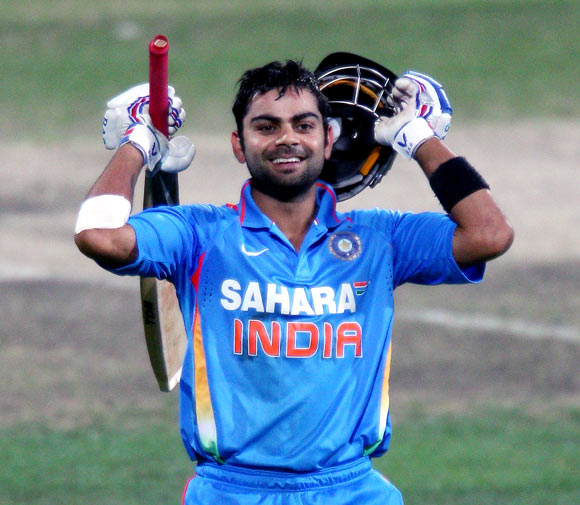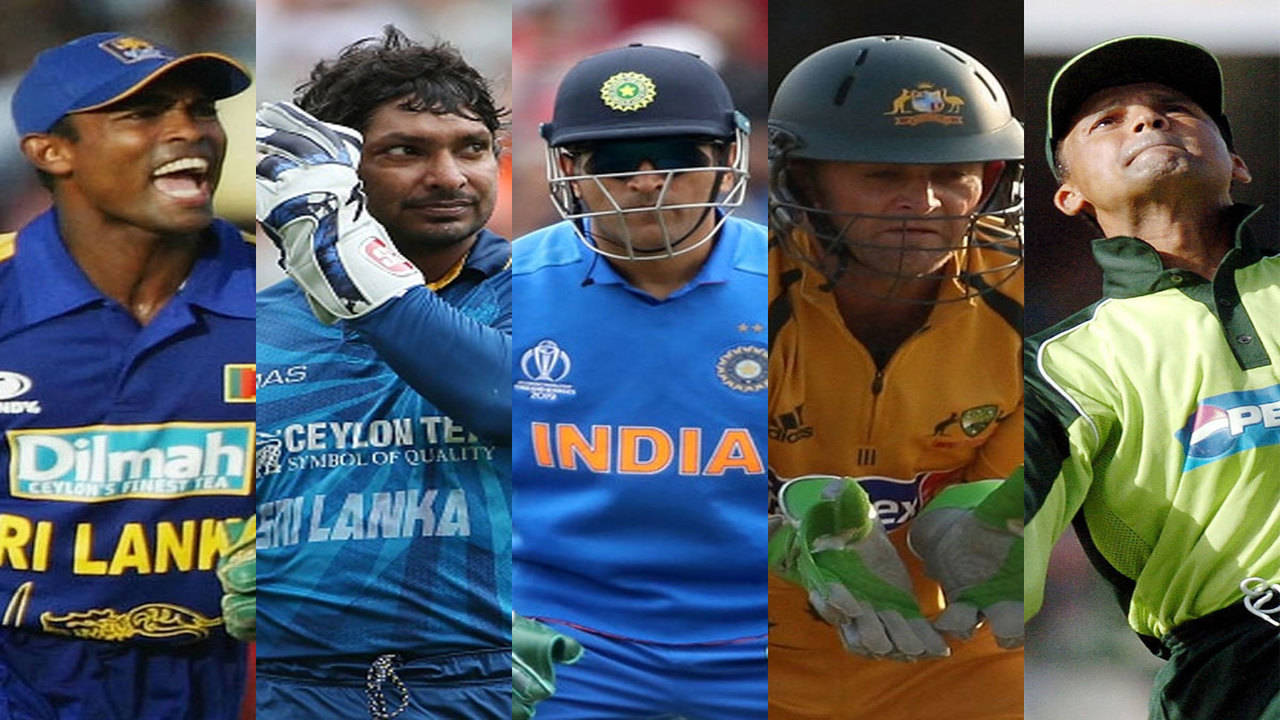Indian Cricket Team Coach List
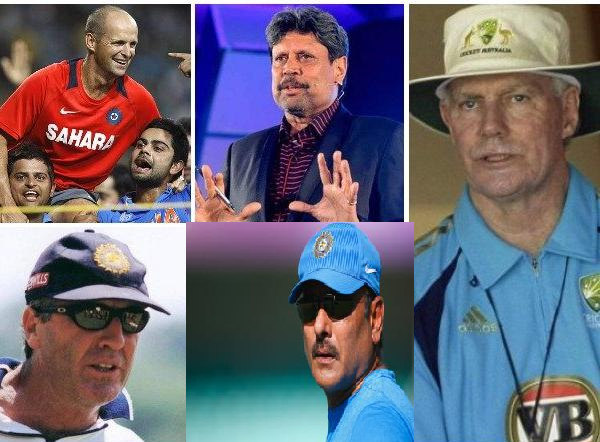
The role of a coach in cricket is pivotal, encompassing the responsibility of strategizing, mentoring players, and fostering a winning mentality. Over the years, the Indian cricket team has been guided by several distinguished coaches who have left indelible marks on its journey. Here is a comprehensive list of the coaches who have shaped the Indian cricket team, along with their contributions.
The role of the Indian Cricket Team coach is pivotal in shaping the team’s performance and fostering a culture of excellence. Tasked with strategizing, mentoring players, and optimizing team dynamics, the coach plays a multifaceted role both on and off the field. They are responsible for analyzing opponents, devising game plans, and providing valuable insights to players to enhance their skills and performance. Additionally, the coach plays a crucial role in fostering team unity, discipline, and professionalism, creating an environment conducive to success. Over the years, India has been fortunate to have had several esteemed coaches who have made significant contributions to the team’s success on the global stage. These coaches bring a wealth of experience, knowledge, and expertise to the role, guiding the team through triumphs and challenges alike. Ultimately, the Indian Cricket Team coach serves as a beacon of inspiration and guidance, steering the team towards greater heights of achievement and glory.
John Wright (2000-2005)
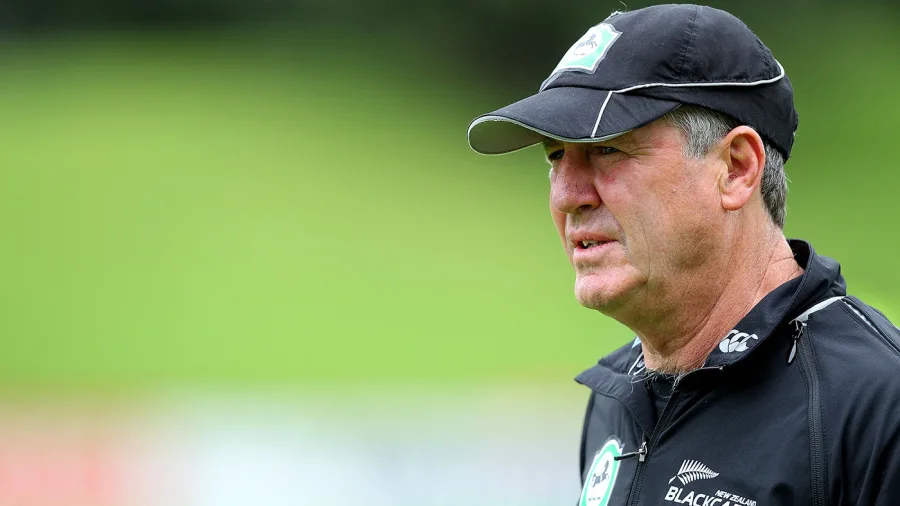
John Wright, a former New Zealand cricketer, was the first foreign coach of the Indian cricket team. His tenure marked a period of significant transformation for Indian cricket. Wright played a crucial role in nurturing young talents like Virender Sehwag, Yuvraj Singh, and Zaheer Khan. Under his guidance, India reached the final of the 2003 ICC World Cup and achieved notable Test series victories, including the historic win against Australia in 2001.
John Wright Biography
John Geoffrey Wright, born on July 5, 1954, in Darfield, Canterbury, New Zealand, is a prominent figure in the world of cricket. Known for his contributions both as a distinguished player and a successful coach, Wright’s career spans multiple decades and continents, leaving an indelible mark on the sport.
John Wright Experiences
John Wright, the first foreign coach of the Indian cricket team, brought a wealth of experience and a fresh perspective to Indian cricket. Having played 82 Tests and 149 One Day Internationals for New Zealand, Wright was known for his gritty batting and astute cricketing mind. His coaching tenure with India, from 2000 to 2005, was marked by significant achievements and a transformative impact on the team. Wright’s calm demeanor, strategic acumen, and emphasis on discipline helped India achieve historic successes, including the famous Test series win against Australia in 2001 and reaching the final of the ICC Cricket World Cup in 2003. His ability to build strong relationships with players and foster a cohesive team environment was instrumental in India’s resurgence as a competitive force in international cricket. Wright’s experience as a player and coach left an enduring legacy, setting a high standard for future coaches of the Indian cricket team.
Greg Chappell (2005-2007)

Greg Chappell, a former Australian captain, succeeded Wright. Chappell’s tenure was marked by controversy and mixed results. Despite the turbulent period, he is credited with promoting young players like MS Dhoni and Suresh Raina. However, his stint ended after India’s early exit from the 2007 ICC World Cup.
Greg Chappell Biography
Gregory Stephen Chappell, born on August 7, 1948, in Unley, South Australia, is one of the most iconic figures in the history of cricket. Known for his elegant batting, sharp cricketing mind, and controversial coaching tenure with the Indian cricket team, Chappell’s career has been both illustrious and eventful. This biography delves into the life and legacy of Greg Chappell, highlighting his contributions to cricket as a player, captain, and coach.
Early Life and Family Background
Greg Chappell was born into a cricketing family. His grandfather, Vic Richardson, was a former Australian Test captain, and his older brother, Ian Chappell, also captained Australia. Growing up in such an environment, it was almost inevitable that Greg would take to cricket. He honed his skills from a young age and displayed immense talent and promise early on.
Gary Kirsten (2008-2011)

Gary Kirsten, a former South African opener, is widely regarded as one of the most successful coaches in Indian cricket history. Under his mentorship, India won the 2011 ICC World Cup, ending a 28-year wait for the coveted trophy. Kirsten’s coaching emphasized team unity and player development, leading India to the top of the ICC Test rankings in 2009.
Gary Kirsten: A Biography of a Cricketing Icon
Gary Kirsten, born on November 23, 1967, in Cape Town, South Africa, is a name synonymous with excellence in cricket. Renowned for his solid batting technique, strategic acumen, and successful coaching career, Kirsten’s journey in the world of cricket is nothing short of inspirational. This biography sheds light on his life, career, and enduring impact on the sport.
Duncan Fletcher (2011-2015)
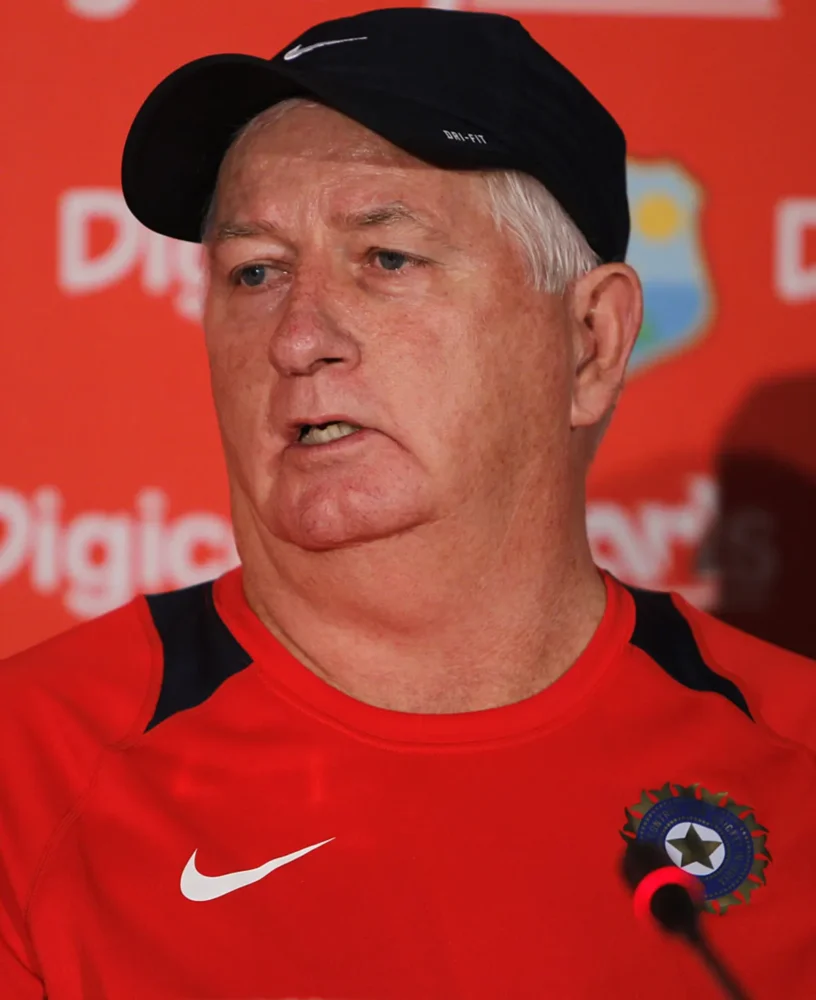
Duncan Fletcher, from Zimbabwe, took over after Kirsten. His tenure saw India transition through a period of rebuilding with the retirements of stalwarts like Sachin Tendulkar, Rahul Dravid, and VVS Laxman. Despite some tough overseas tours, Fletcher guided India to victory in the 2013 ICC Champions Trophy.
Duncan Fletcher Biography
Duncan Andrew Gwynne Fletcher, born on September 27, 1948, in Salisbury, Rhodesia (now Harare, Zimbabwe), is a prominent figure in the cricketing world, renowned for his strategic brilliance and coaching prowess. This biography delves into the life and career of Duncan Fletcher, tracing his journey from a talented cricketer to a successful coach who left an indelible mark on the teams he mentored.
Duncan Fletcher Experiences
Duncan Fletcher, a former Zimbabwean cricketer, brought a profound depth of experience and tactical expertise to his coaching career. His tenure as head coach of the England cricket team from 1999 to 2007 was particularly notable, as he led the team to a historic Ashes victory in 2005, reclaiming the urn after 18 years. Known for his meticulous approach and emphasis on fitness and discipline, Fletcher transformed England into a formidable side. Following his successful stint with England, he took on the role of head coach for the Indian cricket team from 2011 to 2015. During his time with India, he guided the team to several significant achievements, including a Test series win in England in 2014 and the ICC Champions Trophy victory in 2013. Fletcher’s ability to develop young talent and implement strategic innovations underscored his impact on modern cricket coaching, leaving a lasting legacy in the teams he mentored.
Ravi Shastri (Interim Coach 2007, Team Director 2014-2016, Head Coach 2017-2021)
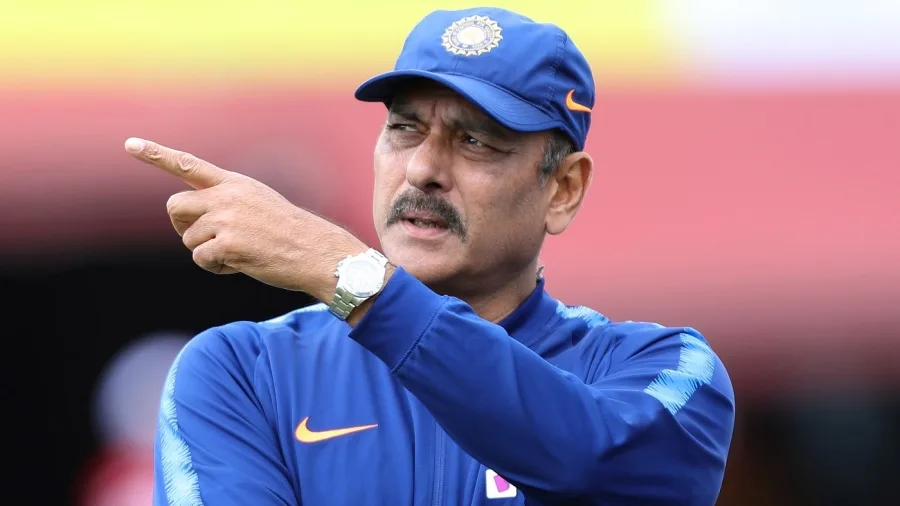
Ravi Shastri, a former Indian all-rounder and commentator, had multiple stints with the team in various capacities. As Team Director and later as Head Coach, Shastri played a significant role in revitalizing Indian cricket. His tenure saw India achieve historic Test series wins in Australia (2018-19, 2020-21) and maintain a strong home record. Shastri’s leadership was characterized by an aggressive approach and backing of young talents.
Ravi Shastri Biography
Ravishankar Jayadritha Shastri, popularly known as Ravi Shastri, is a name synonymous with Indian cricket. Born on May 27, 1962, in Bombay (now Mumbai), India, Shastri’s career has been multifaceted, spanning roles as a dynamic all-rounder, astute commentator, and successful coach of the Indian cricket team. This biography explores the life, achievements, and contributions of Ravi Shastri to the sport of cricket.
Ravi Shastri Experience
Ravi Shastri’s extensive experience in cricket, both as a player and a coach, has had a significant impact on the Indian cricket team. As a player, Shastri was known for his versatility and resilience, representing India in 80 Tests and 150 One Day Internationals (ODIs) from 1981 to 1992. His transition to coaching and commentary further showcased his deep understanding of the game. Shastri’s tenure as the head coach of the Indian cricket team, from 2017 to 2021, was marked by notable achievements, including historic Test series wins in Australia and a significant rise to the top of the ICC Test rankings. Under his guidance, the team also reached the semi-finals of the 2019 ICC Cricket World Cup. Shastri’s coaching style emphasized aggression, self-belief, and teamwork, helping to foster a confident and competitive mindset within the squad. His leadership and strategic acumen have been instrumental in shaping the modern era of Indian cricket, leaving an enduring legacy.
Anil Kumble (2016-2017)

Anil Kumble, one of India’s greatest bowlers, served as the head coach for a brief but impactful period. His tenure included a successful home season with series wins against New Zealand, England, and Australia. However, differences with captain Virat Kohli led to his resignation after just one year.
Anil Kumble Biography

Anil Kumble, born on October 17, 1970, in Bengaluru, India, is a name that resonates deeply with cricket enthusiasts around the world. Renowned for his mastery of leg-spin bowling and unwavering determination, Kumble’s career spanned over two decades, during which he etched his name as one of the greatest spinners in the history of the game. This biography delves into the life, achievements, and enduring legacy of Anil Kumble.
Anil Kumble Experiences
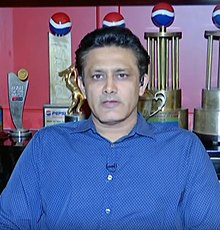
Anil Kumble’s experiences in cricket are a testament to his exceptional skill and leadership both on and off the field. As one of India’s most successful bowlers, Kumble played 132 Tests and 271 One Day Internationals (ODIs) from 1990 to 2008, amassing over 900 international wickets with his unique brand of leg-spin bowling. His playing career is highlighted by remarkable achievements, such as taking all ten wickets in a Test innings against Pakistan in 1999. Transitioning to coaching, Kumble brought his deep cricketing knowledge and strategic thinking to the role. He served as the head coach of the Indian cricket team from 2016 to 2017, during which he helped the team achieve the top spot in the ICC Test rankings and win a series of crucial matches. Kumble’s tenure was characterized by his focus on discipline, work ethic, and the development of young talent, all of which contributed to the team’s growth and success. His experiences as both a player and a coach have left a lasting impact on Indian cricket, embodying dedication and excellence.
Rahul Dravid (2021-Present)

Rahul Dravid, a legendary Indian batsman, took over as head coach in November 2021. Known for his calm demeanor and astute cricketing mind, Dravid had previously excelled as the coach of India’s U-19 and A teams, nurturing future stars like Prithvi Shaw and Shubman Gill. Under Dravid’s guidance, India aims to build a strong, cohesive unit capable of achieving sustained success across formats.
Rahul Dravid Biography

Rahul Sharad Dravid, affectionately known as “The Wall” of Indian cricket, was born on January 11, 1973, in Indore, Madhya Pradesh, India. Dravid’s cricketing journey is a tale of resilience, dedication, and unwavering commitment to the sport. This biography delves into the life, achievements, and enduring legacy of one of India’s greatest cricketers.
Rahul Dravid Experiences

Rahul Dravid, often referred to as “The Wall” for his solid defense and dependable presence at the crease, is a revered figure in the cricketing world. Born on January 11, 1973, in Indore, India, Dravid’s cricketing journey began in Bangalore, where he developed his exceptional technique and patience. Over his illustrious career, he played 164 Tests and 344 One Day Internationals (ODIs) for India, amassing over 24,000 international runs. Known for his classical batting style, Dravid was the backbone of the Indian batting lineup, particularly in Test cricket, where his ability to anchor the innings was invaluable. Beyond his playing career, Dravid transitioned seamlessly into coaching and mentorship roles. As the head coach of the India A and Under-19 teams, he played a pivotal role in nurturing the next generation of Indian cricketers. His tenure as head coach of the Indian senior team since 2021 has been marked by a focus on building a strong, cohesive unit and emphasizing the importance of technique and temperament. Dravid’s contributions to cricket, both on and off the field, underscore his enduring legacy as a player, mentor, and coach.
Contributions and Impact
The impact of these coaches extends beyond just match results. They have been instrumental in:
- Talent Development: Many coaches, especially John Wright, Gary Kirsten, and Rahul Dravid, focused on nurturing young talents and ensuring a steady pipeline of skilled players for the national team.
- Strategic Excellence: Coaches like Gary Kirsten and Ravi Shastri have emphasized strategic planning and adaptability, crucial for winning in diverse conditions.
- Team Unity and Culture: Successful coaches have fostered a culture of unity, resilience, and professionalism within the team.
Conclusion
The Indian cricket team has been fortunate to be guided by a diverse array of coaches, each bringing their unique style and strengths to the role. From John Wright’s pioneering tenure to Rahul Dravid’s current leadership, these coaches have significantly contributed to shaping the team’s fortunes and ensuring India’s prominent position in world cricket. Their legacies are reflected not just in trophies and victories but in the growth and development of Indian cricket as a whole.


